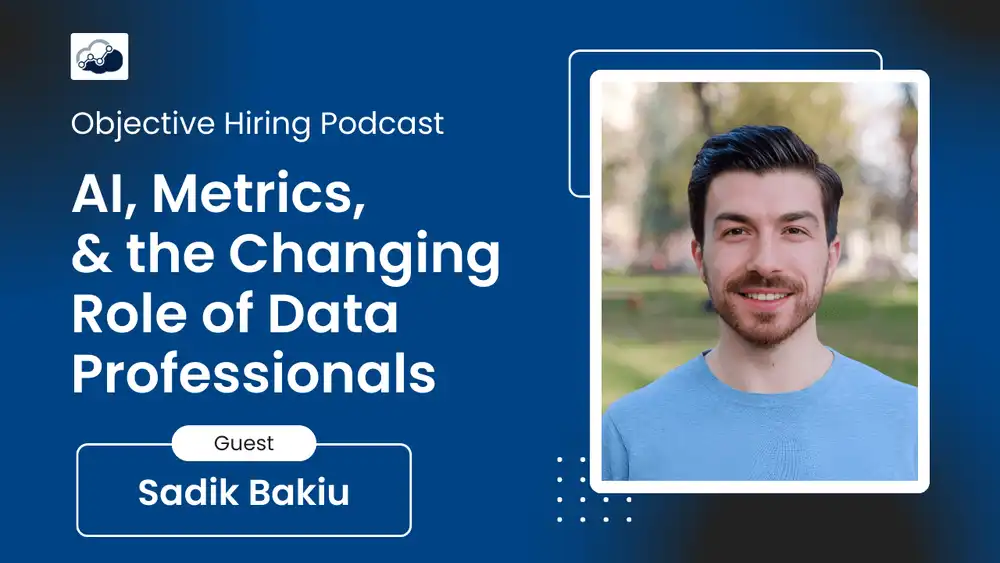Sadik Bakiu on the Role of AI in Transforming Hiring Processes

Sadik Bakiu on the Role of AI in Transforming Hiring Processes
The latest episode of the Objective Hiring podcast features Sadik Bakiu, CEO and Data Expert at Data Max. Hosted by Tim Freestone, the conversation delves into how artificial intelligence (AI) is reshaping the hiring landscape and enabling data-driven approaches to make the process fairer, faster, and more effective.
Sadik shared valuable insights on the future of hiring, focusing on leveraging AI to evaluate candidates objectively, eliminate reliance on vanity metrics, and reduce time-to-hire. Here are some key takeaways from their discussion.
Moving Beyond Vanity Metrics
One of Sadik’s key points was the need for companies to focus on the right hiring metrics. Vanity metrics, such as the number of applications received or rejection rates, do little to improve hiring outcomes. Instead, Sadik suggested measuring actionable metrics like time-to-hire and candidate engagement.
“You need to incentivize the right metrics,” Sadik explained. “For example, how long does it take for a candidate from submitting their CV to getting a final decision? That’s what companies need to focus on.”
With the rise of AI tools like ChatGPT, the volume of applications has increased dramatically, but quantity does not equate to quality. Many applicants are submitting mass applications, leading to lower engagement and motivation per application. Sadik referred to this as the "spray and pray" approach, which makes evaluating candidates even more challenging.
AI as a Catalyst for Objectivity in Hiring
A significant theme in the episode was the role of AI in promoting objectivity in hiring. Traditional hiring methods often rely heavily on gut feeling and intuition, which can introduce bias and inconsistency. Sadik highlighted how AI can help standardise evaluations by focusing on skills and capabilities rather than superficial factors like educational background or years of experience.
“In order to have data-driven hiring, you need to be careful about what metrics you’re measuring,” Sadik said. “AI can help ensure that the process is optimised in the right direction.”
By incorporating skills assessments and AI-driven analytics, companies can evaluate candidates based on their actual abilities. Platforms like Alooba are at the forefront of this shift, offering tools that enable businesses to objectively assess candidates and reduce bias in hiring decisions. If you're looking to make your hiring process more objective and efficient, sign up for Alooba today.
The Challenge of Mass Applications
The discussion also touched on the challenges posed by AI-generated applications. Tools like ChatGPT have made it easier for job seekers to apply to multiple roles simultaneously, but this has led to a surge in irrelevant or low-quality applications. Sadik noted that this trend makes it harder for companies to identify truly interested and qualified candidates.
“When 10,000 people apply for your job, it tells you nothing about the quality or relevance of these applicants,” he explained. “It’s basically empty.”
To combat this, companies need to adopt more sophisticated filtering and evaluation mechanisms. AI can play a pivotal role here by quickly analysing large volumes of applications and identifying the most suitable candidates.
Streamlining the Hiring Process
Sadik emphasised the importance of making the hiring process as seamless and stress-free as possible for both candidates and employers. Long and cumbersome hiring processes not only waste time but also risk losing top talent to competitors.
“Hiring should be as easy as possible for both sides,” Sadik said. “It should not be something stressful.”
By leveraging AI to automate repetitive tasks such as CV screening and initial assessments, companies can significantly reduce time-to-hire. This not only improves the candidate experience but also allows hiring managers to focus on more critical aspects of the process.
Data-Driven Decision Making
Another key point raised during the conversation was the importance of involving technical teams in the hiring process. Sadik shared how his company ensures that engineers review CVs for technical roles, as they are better equipped to evaluate candidates’ skills and relevance.
“HR is very important, but they’re not the ones who will be closely working with the candidate,” Sadik explained. �“Having engineers review CVs gives a more realistic evaluation of how the candidate fits the role.”
This approach aligns with the broader theme of data-driven hiring, where decisions are based on measurable criteria rather than subjective opinions. By incorporating structured assessments and involving domain experts, companies can make more informed hiring decisions.
Balancing Soft Skills and Technical Skills
The episode also explored the balance between soft skills and technical skills in hiring. While some companies prioritise soft skills, Sadik cautioned against overlooking technical competencies, particularly for roles that require specialised expertise.
“If you hire someone with very good soft skills but lacking technical skills, they’re not going to be very productive,” Sadik said. “At the same time, hiring someone with strong technical skills but poor soft skills can create a hostile environment.”
Finding the right balance is crucial, especially in technical fields like data science and engineering, where both skill sets are essential for success.
The Future of AI in Hiring
Looking ahead, Sadik believes AI will continue to transform hiring processes by providing more tools to assess candidates objectively and efficiently. However, he also acknowledged the challenges of implementing these changes, particularly in organisations resistant to change.
“The world is not waiting for you,” Sadik said. “You need to be constantly re-evaluating your processes and adapting to new technologies.”
For companies looking to stay ahead, adopting AI-powered hiring solutions like Alooba can be a game-changer. By focusing on skills and data-driven metrics, businesses can build stronger, more effective teams.
Listen to the Full Episode
To hear more of Sadik’s insights on AI and hiring, check out the full episode of the Objective Hiring podcast with Tim Freestone.